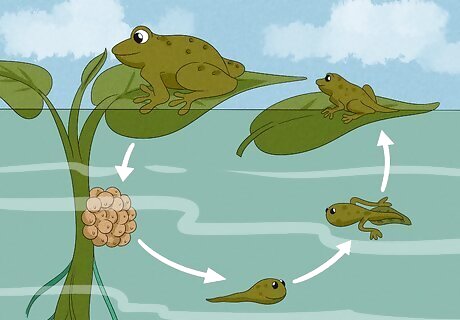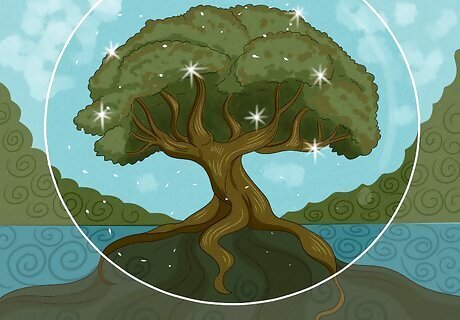
views
- Emotionally, water can symbolizes profound depth, changing feelings, or sadness.
- Water is also a universal representation of life since no plant or animal can live without it.
- Spiritually, water invokes ideas of purification, rejuvenation, and transformation.
Depth

Psychologically, water symbolizes profound or elusive ideas. When someone says something is as “deep as the ocean,” they’re likely describing it as mysterious or important. Water has depth, meaning it’s practically endless—you never know when you’ll reach the bottom. This depth is also used to describe human emotions. As the popular proverb says, “Still waters run deep.”
Emotions

Astrologically, water represents the emotional zodiac signs. Pisces, Cancer, and Scorpio are water signs and are famously known for being the most emotional of the star signs. That’s because the ebb and flow of water is often associated with mood swings and fluctuating feelings. As a literary example, Toni Morrison uses phrases like “wave of grief” and “ice cake torn away from the solid surface of the stream” to convey her characters' deep emotions in the novel Beloved.
Sadness

Water symbolizes tears and deep sorrow. What comes out of your eyes when you cry? Water. This element is often associated with tearful or weary feelings. For instance, when it rains in a movie scene, the main character is most likely sad. That’s because the dreary weather associated with rain evokes remorse or sadness. In this context, someone may say they’re feeling “watered down,” like they're “treading water,” or are in “troubled waters.”
Life

Water is a universal symbol of life across cultures past and present. As you probably know, water is essential for all life—nothing can live without water. Because of this, it’s often used to symbolize growth and vitality. In Egyptian culture, life and water are represented by the same symbol: the ankh.
Movement

Water metaphorically represents flow. Think about it: when did you last see water stand completely still? Chances are, you haven’t. Water is constantly moving, and how it moves can symbolize specific emotions or feelings in literature. For instance, you may be familiar with the phrase “Having a ripple effect,” which depicts that one action can cause other things to occur.
Purification

In Christianity, water is a sign of purity and holiness. Water is used to clean things literally and spiritually. For instance, Christians use water to cleanse people of sin during baptisms, washing away any imperfections to give themselves to God. Many bodies of water are considered religiously sacred for this very reason. In Hinduism, for example, bathing in the Ganges River is said to aid spiritual transformation and cleanse one of crimes.
Rebirth

Water can also represent the repeating cycle of birth, life, and death. The water you use each and every day has been on Earth longer than you have. It’s seen countless births and deaths and is an essential part of the life cycle. Because of this, many creators use water as a symbol of renewal, rebirth, and enlightenment. For instance, Yann Martel’s Life of Pi showcases a boy who has a near-death experience out at sea. While on the water, he undergoes a personal enlightenment and reinvents himself. In the Bible, a giant flood destroys everything on Earth except for what Noah has in his ark. The flood washes the sins of the Earth away as a biblical renewal.
Rejuvenation

In many religions, water represents healing and new beginnings. With its life-giving energy, water is commonly used to symbolize health and invigoration. For example, the myth of the fountain of youth (which originated in the 5th century BC) says water has magical properties that can heal any ailment, even age. In Native American culture, water is 1 of the 4 Directions on the Medicine Wheel or Sacred Hoop, which is used for traditional healing practices.
Self-reflection

Water is a mirror of self-awareness. Water is reflective, and this reflection is often used in literature and pop culture to represent superficiality, deception, or a person’s ability to change. For example, consider the scene in Disney’s Mulan where Mulan stares at her reflection in a puddle of water. In this moment, Mulan realizes what she must do: disguise herself as a man and begin her new journey, transforming and embodying her true self. In Greek mythology, Narcissus falls in love with his own reflection after looking in a pool of water, emphasizing the vanity of humanity.
Subconsciousness

Water is a literary metaphor for the subconscious mind. Like deep water, the subconscious mind is a mystery—no one knows what lies underneath. It’s unpredictable, vast, and ever-changing, making water a perfect representation. Subconscious thoughts and behaviors can bubble up without recollection, similar to how anything can surface beneath the waves. One of the most famous examples of this is the representation of water in Herman Melville’s Moby Dick. In the novel, the sea represents the churning, beautiful, and maddening concepts of the human psyche.
Transformation

Water symbolizes metamorphosis and change. Water has 3 forms: liquid, solid, and gas. The element has the ability to transform and move between all 3 in the right conditions. This phenomenon mirrors your ability to change and transform your own life as long as you have the motivation. Along with this, water is a constant habitat for evolution. Frogs, for example, start in water as tadpoles and transform into frogs over time. In the Bible, the Lord transforms water into wine.
Wisdom

In mythology, water is a symbol of knowledge and truth. More often than not, water is used in mythological tales and folklore to represent universal wisdom. For instance, in Norse mythology, the Yggdrasil Tree grows out of the Well of Urd, a deep well brimming with knowledge and the secrets of the cosmos. In Irish folklore, the story of Sinann depicts a woman following a stream to pursue knowledge.




















Comments
0 comment